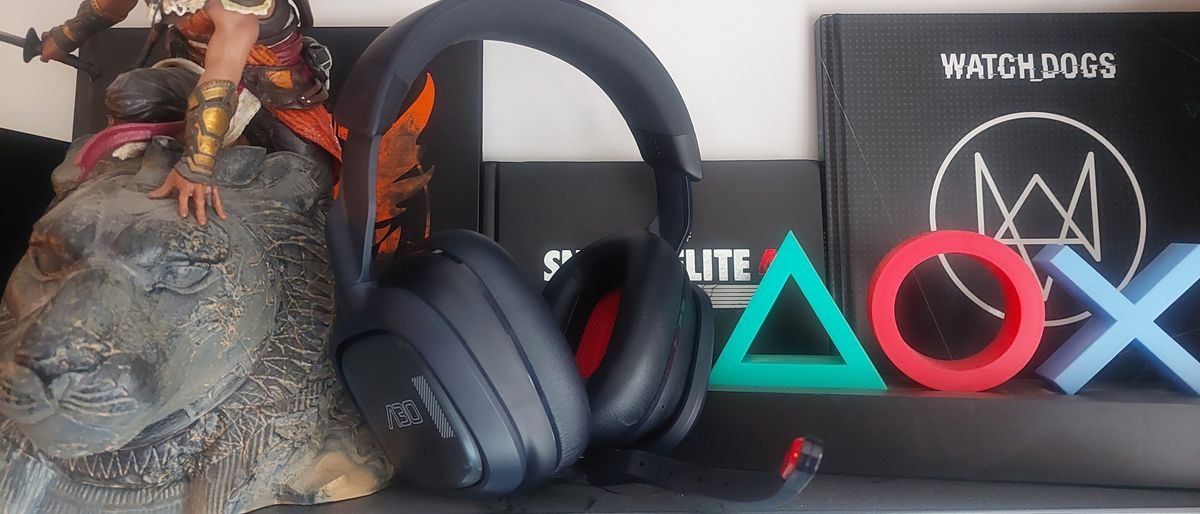12DOVE Verdict
The Astro A30 is as close to the perfect do-it-all, multi-platform gaming headset that we've ever tested. With terrific gaming audio that also excels in any other media, the headset is one of the most versatile wireless headsets we've tested and is fully deserving of its five-star score.
Pros
- +
Excellent audio quality
- +
Great boom mic
- +
Terrific versatility
- +
Robust build quality and great on-board controls
Cons
- -
Built-in mics are just OK
Why you can trust 12DOVE
The Astro A30 Wireless gaming headset is another set aiming to be that one-stop solution; that do-it-all headset for all platforms and all uses. It's a noble pursuit and one that could plug a lot of gaps, serving gamers exceptionally well.
If the A30 Wireless nails it, even with a price tag of $250/£230, it really could be a top set - and that's before we even get to factoring in that awesome Astro gaming audio pedigree. After spending a few weeks with the headset - and I'd have liked to have revealed this sooner - the signs are great. This really could be one of the very best gaming headsets of the whole year, and certainly one of the best wireless gaming headsets money can buy.
Design & Features
It's immediately apparent that the Astro A30 Wireless has all kinds of scenarios in mind when looking at its design and build - and also a change of aesthetic from previous styles. Gone is the spiky, hard-edge, rectilinear, and gamer-y aesthetic of the likes of the Astro A50 and others that came before. Now there are curved and softened corners that edge the headset toward a headphone feel. Don't get me wrong, this is still very much an Astro device, but the change in approach to the aesthetic is welcome. Available in white or navy blue, the A30 is attractive in both and wouldn't look out of place on your head while you're on a train, sitting at your PC, or while you're slouching on the sofa. And you could wear the A30 effortlessly for hours in each of those settings; the design is robust and sturdy while also being relatively lightweight, and very comfortable.
Design: Over-ear, closed back
Type: 2.4Ghz Lightspeed wireless (USB); Bluetooth; wired 3.5mm
Drivers: 40mm
Microphone: Dual mics: boom and built-in
Compatibility: PC, PlayStation, Xbox, Switch, Mobile
Connectivity: 2.4Ghz wireless, Bluetooth, 3.5mm aux
Impedance: 32 ohm
Frequency response: 20Hz - 20kHz
Tested on PC, PS5, and mobile.
Onboard controls are pretty much as they should be but housed slightly differently. The 'more normal' stuff is covered simply: the power button is on the back at the top of the right cup, the Bluetooth button below that, and the mic mute button is on the rear of the left cup. Then things get 'unique'. The rest of the controls are built into a joystick on the bottom of the right cup. This is largely a success, squishing in volume up/down, game/chat audio balance into the directions of the joystick, and the button press of the same feature then acts as a controller for music and calls when the Bluetooth connection is engaged. This is all neat and tidy and works very well indeed.
There are also two mics on board - or rather two mic setups; a detachable boom mic for play, and integrated mics for calls. This is excellent flexibility and enhances the versatility and flexibility that the headset offers.
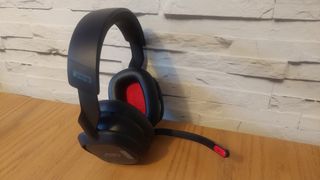
Elsewhere, the plates on the side of each cup are removable, being attached by magnets. These don't open up to offer an ingenious battery solution like the SteelSeries Arctis Nova Pro does, admittedly, but that does cost a fair bit more. No, these plates are more so that you can customise the look of your A30 and personalise it. A nice touch.
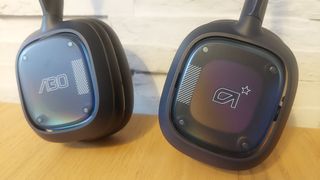
Performance
Astro has always given us some of the best gaming audio going, but is that lost in the A30 Wireless as it attempts to be a do-it-all headset? No. Very much no.
That rich gaming audio is front and centre of the headset's performance, and it really can turn its hand to all the platforms it's compatible with too.
I tested the headset (sold and packaged as a PC and PS5 headset, but the A30 can just be used with anything) across both of these platforms. On PC, Red Dead 2's environments were as beautiful as I'd ever 'heard' it, from bird sounds to rivers, to distant old-fashioned gunfire. Meanwhile, the dialogue and barking of units that appeared in games like Total War: Troy, and Dawn of War III were crisp and clear above any other cacophonies.
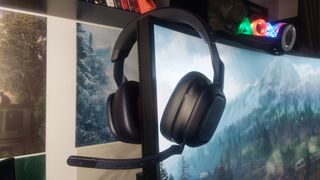
A Plague Tale: Requiem was a particular highlight on PS5 too, with each rat squeak seemingly given its own audio profile, while the creaks of wood and trees, Amicia's heavy and panicked breathing, and the snap of her sling were all incredible. Rainbow Six: Extraction was also a joy with the A30 balancing comms and game audio beautifully. There was never a time that my voice didn't carry without flaw to my teammates (the boom mic is rich and clear), nor a time when I couldn't be prepared for enemies' locations and movements given the detailed audio cues.
I made a custom EQ profile for Extraction via the Logitech G app, which enhanced the A30's performance even further. As a result of that, I will say that using the app is the best way to get the most out of your A30. Even away from EQ profiles to mess about with, it's vital to change things like the side tone that was on by default (that was annoying me; nobody wants to hear their own voice like that). And to be clear, it is only the app - there is no Astro Command Centre.
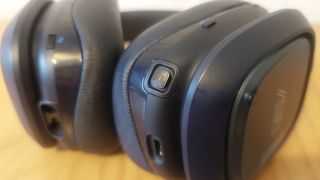
The options in the Logitech G mobile app to change EQ are actually quite good, by the way. They are simple - only featuring five sliders - but you can recreate settings you may have used in the command center and still implement your required changes easily. And then it's equally easy to flick between profiles if you change game or media.
A supreme level of performance, overall, then, and one most befitting of the Astro name, no matter what you use it for or where you wear it - even taking the headset out on dog walks is a joy as music is blasted richly and beautifully into your ears. However, I will say one small drawback is that the built-in mics are only OK; good enough for calls and meetings at home, but maybe not much more (which is fine though - built-in mics can never truly compare to boom mics).
In terms of use, the sounds and beeps do take some getting used to, but the joystick largely holds up as a great way to combine controls. It's intuitive and easy to use with your thumb or finger.
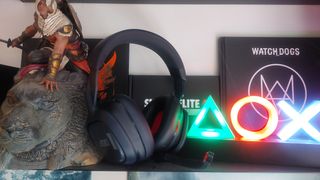
Should you buy the Astro A30 Wireless?
I really, really like the Astro A30 - as you may have guessed. It excels in every way, and the audio across all media is as good as it gets. Going wireless and also chucking in incredible functionality and versatility? Exquisite. The design is chic and cool, the build is robust, the customisation options are a nice bonus, and the companion app is genuinely useful. It's basically a full house.
One tiny eyebrow-raiser for me, as an aside more than anything, is that, in practice, it's actually a bit difficult to pin down exactly which platform this headset is most at home with. It just excels with all of them. For example, the switch away from the Astro Command Center software means it 'loses' a USP as a PC gaming headset somewhat - but not its performance or pedigree on PC, of course. The flip side of it having no 'home platform' is that it can just be an 'any platform' headset - and that is just great.
When I reviewed the Razer Barracuda Pro I really thought I'd found the one wireless headset, across platforms, to recommend to folks easily. However, the Astro A30 Wireless has taken that mantle, and comfortably so. It's also cheaper than the Barracuda Pro. It's simply the best all-round wireless gaming headset I've reviewed in 2022 - probably ever - and is an absolutely tremendous headset that does it all.
How we tested the Astro A30 Wireless
The Astro A30 Wireless was my everyday headset for play and for work for the best part of a few weeks.
On PlayStation 5, I tested the headset with regular sessions of Middle Earth: Shadow of War and A Plague Tale: Requiem, while I also used it for many hours of Rainbow Six: Extraction. These gave me a range of audio profiles and game types to experience, as well as ensure I could put the microphone to the test, garnering my friends feedback in the process. On PC< I gave the headset a whirl in strategy games like Total War: Troy, futuristic action-y games like Dawn of War III, and also a bit of Red Dead 2 and Apex Legends.
Away from games, I used the A30 for some meetings at work, and to listen to background music while I wrote and edited. I also tested the Bluetooth functionality and both mics for taking calls.
You can read more about how we test gaming headsets as well as how we make all our recommendations in the full 12DOVE Hardware Policy.
Tested on PC with a Razer Blade 15 laptop supplied by Razer and with an Acer Predator X38 monitor from Acer.
Remember, the Astro A30 can be used as an Xbox Series X headset, and as a Nintendo Switch headset too, so check out those guides to see how it compares.
Rob is the Deputy Editor of sister site, TechRadar Gaming, and has been in the games and tech industry for years. Prior to a recent stint as Gaming Editor at WePC, Rob was the Commissioning Editor for Hardware at 12DOVE, and was on the hardware team for more than four years, since its inception in late 2018. He is also a writer on games and has had work published over the last six years or so at the likes of Eurogamer, RPS, PCGN, and more. He is also a qualified landscape and garden designer, so does that in his spare time, while he is also an expert on the virtual landscapes and environments of games and loves to write about them too, including in an upcoming book on the topic!

37-year-old studio behind iconic PC game Myst and one of the longest-surviving indies in the world just laid off "roughly half the team"

Filming has started on the second season of beloved Hulu show Paradise, only weeks after the hit Disney Plus show ended

Reacher star is being fan-cast as the MCU version of Tom Hardy's fan-favorite Spider-Man character

